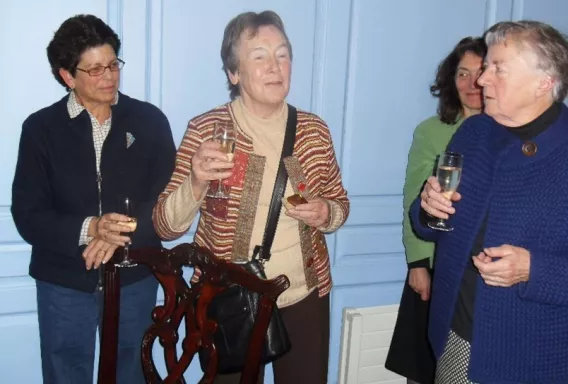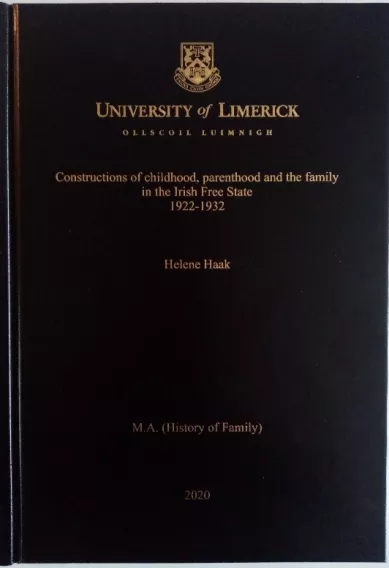
After starting a PhD based on my MA History of Family research, the Women’s History Association of Ireland’s (WHAI) annual MacCurtain/Cullen essay prize competition offered me the opportunity to work on my editing and writing skills.
I was in my fourth year of studying English and History in UL as an undergraduate when I discovered my passion for social history and research. The MA History of Family programme at UL was therefore the perfect postgraduate course for me, as I was introduced to concepts, theories, primary sources and research skills central to social history and the study of lifecycles. The programme also deepened my interest in the history of childhood and parenthood and I decided to write my MA dissertation in this area under the supervision of Dr Rachel Murphy.
As COVID limited opportunities to access archives and I enjoyed the research process, I resolved to build on my MA dissertation by enrolling in a PhD programme. I was fortunate to secure Dr Ciara Breathnach as my PhD supervisor and to be able to avail of her guidance and support when applying for the PhD programme and preparing my first research proposal, which was awarded a Fee Waiver by the Faculty of Arts, Humanities and Social Science in UL. Once I started working on my PhD methodology, the research I had conducted for the MA dissertation was quickly overtaken by new ideas for my future research. It was only when a fellow MA graduate and friend, familiar with my topic encouraged me to enter the WHAI’s annual MacCurtain/Cullen prize competition. Then, I began thinking about sharing my MA research with a wider audience.

Choosing a Place for your Research
Margaret MacCurtain and Mary Cullen at an WHAI event November 2009. Photograph by kind permission: Women’s History Association of Ireland.
The WHAI’s MacCurtain/Cullen essay prize is awarded annually for the best BA or MA research essay in Irish women’s or gender history, to honour Margaret MacCurtain and Mary Cullen’s outstanding contributions to Irish women’s history. I decided that this would be a great opportunity to gain experience in editing and refining existing research, to share the findings of my MA dissertation and to receive expert feedback on my research concepts beyond that of my supervisors. While the lengthy process of submitting an article for review to an academic journal can be daunting (or at least was so for me) when starting out as a PhD student. Prizes and competitions offered by research associations and bodies targeted at students can be a great way of ‘testing’ this process and to improve editing and review skills. Checking for organisations related to your research area and applying for membership can be a good first step.
Editing your Research
After identifying the most suitable piece of your existing research, editing what has already been written can be a really difficult process. I chose a chapter from my MA dissertation that explored concepts of parenthood and was already close to the required word count. Following consultation with Dr Breathnach, I focused on three interrelated main points to rework the existing writing. First, the chapter had to be transformed into an essay able to stand alone, without the supplemental explanations, literature review and contextual information in the dissertation’s introduction. This meant that I had to rework the scope and introduction of the essay while reducing the overall word count from a 24,000-word dissertation to an 8,000-word essay that would still include all relevant contextual and explanatory material, set up the chapter’s topic and provide necessary definitions of concepts and theories. Following these changes to the beginning of the essay, I had to add an explanation of the methodology from the introduction of the dissertation. Other changes to the discussion of the essay included structural considerations and work on repetitive language. This process really helped me to identify some weaknesses in my writing, especially my apparently subconscious fear of plagiarising, which had led to a habit of over-footnoting. With my supervisor’s help, I learned to take greater ownership of my research, to identify the more ‘authoritative’ sources and reduce the number of footnotes overall.

Get Feedback
I was fortunate to benefit from feedback and support from Dr Murphy and Dr Breathnach. While everyone probably has their own perception of their strengths and weaknesses in terms of academic writing, input from experts well-versed in the submission of articles helps to let go of old habits and to advance writing and editing skills. Even if there is no opportunity to consult an expert, friends, colleagues and fellow students can offer feedback and help identify sections that seem unclear or confusing to a reader.
Editing my existing work to transform it into a new format outside of university submissions was a difficult process, a steep learning curve and beneficial for my research in many ways. Apart from giving me more confidence in my writing skills, it also helped me to understand the process involved in preparing writing for submission and the time it takes until a useful result is reached. To see my writing improve was rewarding in itself, but of course, I am delighted to have been awarded the MacCurtain/Cullen essay prize 2021 by the WHAI for the result of this process, an essay entitled ‘Concepts of parenthood: mothers and fathers in the Irish Free State, 1922-1932’. I also received helpful and encouraging feedback from the WHAI reviewers. The next step for the essay will be to prepare it for submission in an appropriate academic journal – another challenge I can look forward to.
